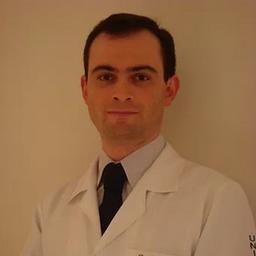Additional Filters
Best General practitioners (GP)
Found 5 General practitioners (GP)
Dr. Ligia de Carvalho Leite
Medical clinic with postgraduate training in pain in Piracicaba.
General practitioners (GP)
Video consultation
Video consultation
Dr. Debora R Bonito
Clinical Doctor in Santo André
General practitioners (GP)
Dr. Renato Laks
Specialist in Internal Medicine and Geriatrics in São Paulo
General practitioners (GP)
Dr. Milena dos Reis Bezerra de Souza
Palliative Doctor in São Paulo
General practitioners (GP)
Dr. Bruna Calino
Specialist in Elderly Health in Rio de Janeiro
General practitioners (GP)
Visitors who were interested in General practitioners (GP) also searched for:
General practitioners (GP) by cities
- General practitioners (GP) in Piracicaba
- General practitioners (GP) in Porto Alegre
- General practitioners (GP) in Contagem
- General practitioners (GP) in Rio de Janeiro
- General practitioners (GP) in Campo Grande
- General practitioners (GP) in Sao Luis
- General practitioners (GP) in Anapolis
- General practitioners (GP) in Recife
- General practitioners (GP) in Jundiai
- General practitioners (GP) in Rio Branco
Visitors who were interested in General practitioners (GP) also searched for:
General information on medical treatment
What is a clinical physician?
A clinical physician is a highly qualified professional, responsible for the diagnosis, treatment, and prevention of various health conditions. They act as the first point of contact for medical care, offering continuous and integrative care that covers all ages and life stages. Their focus is on promoting general well-being and ensuring long-term quality health.
This professional is often the first to identify health conditions, avoiding the need for immediate referrals to specialists. This optimizes the patient's time and costs, while providing more efficient and targeted healthcare.
Education and specialization of the clinical physician
The clinical physician has a solid academic background that includes six years of medical school, followed by a medical residency in internal medicine that lasts two to three years. During this period, the professional acquires comprehensive knowledge about various medical specialties, developing skills to diagnose and treat a wide range of conditions.
Continuous education is essential for these professionals, who must stay updated with scientific advances through conferences, update courses, and recent medical publications. Many clinical physicians also obtain specialist titles in internal medicine, granted after rigorous evaluations by recognized medical entities.
Role of the clinical physician in patient care
The clinical physician provides general and continuous medical care, being the first point of contact for patients seeking help for their health conditions. Their function involves diagnosing, treating, and monitoring a wide variety of diseases, from simple conditions, such as colds, to more complex conditions, such as hypertension and diabetes. Additionally, they perform physical examinations, prescribe treatments and medications, and can refer the patient to a specialist when necessary.
This professional is also essential for the regular monitoring of chronic diseases, adjusting treatment according to the patient's evolution and offering guidance for lifestyle changes. The clinical physician promotes preventive health, conducts periodic examinations, and guides their patients on healthy practices, always seeking to improve quality of life and prevent long-term diseases.
The clinical physician in primary healthcare
The clinical physician plays a fundamental role in primary healthcare, acting as a gateway to the health system. They develop a holistic view of the patient, considering biological, psychological, and social aspects that influence health, providing integrated and longitudinal care.
In primary care, this professional works with a person-centered approach, establishing bonds of trust that facilitate adherence to treatments and behavioral changes. The clinical physician also participates in community actions and public health programs, contributing to improving the population's health indicators and reducing inequalities in access to health services.
How the clinical physician can help in disease prevention
The main contribution of the clinical physician is disease prevention. They guide the patient on how to maintain a healthy lifestyle, in addition to performing preventive exams to identify health conditions in early stages, when treatment is most effective. Their work aims to reduce the risks of chronic diseases, such as diabetes and heart disease.
The clinical physician educates the patient on how to modify risk behaviors, such as smoking and excessive alcohol consumption, thus preventing diseases that can affect health in the long term. They also work to prevent the development of more serious conditions, through regular and personalized monitoring.
Advice on healthy habits
The clinical physician guides their patients on the importance of healthy habits, such as a balanced diet, regular physical exercise, stress management, and maintaining a healthy weight. They provide information on how to avoid risk behaviors, helping to prevent diseases such as cancer, cardiovascular diseases, and diabetes.
Preventive exams and regular screenings
An important part of prevention is conducting regular examinations to identify health problems before they become serious. The clinical physician performs screenings to detect diseases such as hypertension, diabetes, high cholesterol, and cancer in early stages, when treatment is most effective. This allows for early intervention, minimizing risks and improving the patient's chances of recovery.
The role of the clinical physician in managing chronic diseases
The clinical physician plays an essential role in managing chronic diseases such as hypertension, diabetes, and heart problems. They develop personalized therapeutic plans, considering the particularities of each patient, including comorbidities, medications in use, and social circumstances that may influence treatment.
In the continuous management of these conditions, the clinician makes periodic adjustments to medications, monitors clinical and laboratory parameters, and works together with the patient to establish realistic goals for disease control. This longitudinal and individualized approach is fundamental to prevent complications and significantly improve the quality of life of patients with chronic conditions.
The doctor-patient relationship in clinical medicine
The relationship between the clinical physician and their patient goes beyond the simple diagnosis and treatment of diseases. It is based on trust, empathy, and effective communication, elements that contribute significantly to positive therapeutic results and greater adherence to recommended treatments.
The clinical physician develops active listening and clear communication skills, adapting their language to the patient's level of understanding and actively involving them in decisions about their health. This collaborative relationship strengthens the patient's autonomy and creates an environment where sensitive issues can be openly discussed, resulting in more accurate diagnoses and treatments better suited to individual needs.
When to seek a clinical physician?
You should seek a clinical physician when you present persistent symptoms or any change in your well-being. If the condition is simple, such as a flu or headache, the clinical physician can quickly diagnose and provide the appropriate treatment. For chronic conditions, such as diabetes or hypertension, they will monitor and adjust your treatment over time.
If you are feeling constant pain, have noticed changes in your health, such as unexplained fatigue, digestive problems, or weight changes without apparent reason, the clinical physician is the indicated professional. They can help you understand the symptoms and start appropriate treatment, as well as refer you to specialists when necessary.
Signs and symptoms that should not be ignored
There are certain signs and symptoms that deserve immediate attention from a clinical physician, as they may indicate potentially serious conditions. Chest pains, especially if accompanied by shortness of breath or radiation to the left arm, may signal heart problems and require urgent evaluation.
Other worrying signs include persistent fever above 38.5°C, intense and sudden headaches, unexplained weight loss, abnormal bleeding, and significant changes in bowel or urinary habits. Early recognition of these symptoms and seeking appropriate medical care can be decisive for a timely diagnosis and effective treatment of various conditions.
The importance of the clinical physician in mental health
The clinical physician is crucial in identifying emotional disorders such as anxiety, depression, and stress. With their comprehensive look, they can recognize early signs of psychological problems, which often get confused with physical issues.
Although not a specialist, the clinical physician offers initial support and guides the patient on the next steps, referring them to a psychologist or psychiatrist when necessary. Their relationship of trust facilitates communication and improves treatment effectiveness.
The continuous monitoring by the clinical physician is also essential to ensure that the treatment is effective. They monitor the patient's mental health, helping to maintain general well-being and promoting an integral approach to dealing with emotional challenges.
Integrative medicine and the clinical physician
Integrative medicine, which combines conventional medical practices with complementary approaches, has found space in the work of the modern clinical physician. These professionals are increasingly open to considering therapeutic options such as acupuncture, phytotherapy, and relaxation techniques, as long as they have adequate scientific support.
The clinical physician with an integrative vision considers the patient in their totality, recognizing the influence of factors such as nutrition, physical activity, sleep quality, and stress management in the health-disease process. This expanded approach allows developing therapeutic plans that incorporate multiple dimensions of care, resulting in more effective treatments centered on the individual needs of each person.
What to expect from a consultation with a clinical physician?
During a consultation with a clinical physician, you can expect comprehensive care focused on your overall health. The doctor begins by listening carefully to your complaints and symptoms, to understand the clinical picture.
Physical examination and assessment
The doctor will perform a complete physical examination, checking vital signs such as blood pressure, temperature, and heart rate. They may also perform specific tests according to your complaints.
Diagnosis and treatment plan
Based on the assessment, the clinical physician can diagnose the condition and prescribe appropriate treatments. If necessary, they will make referrals to specialists or complementary examinations.
Continuous monitoring and guidance
The clinical physician provides guidance on preventive health practices, lifestyle changes, and offers regular follow-up, ensuring that the patient has a personalized and effective health plan.
The clinical physician's office in the digital era
Telemedicine and digital technologies have significantly transformed the practice of the clinical physician. Video consultations, remote monitoring of chronic patients, and health applications have become important tools in the arsenal of these professionals, increasing access to medical care and improving continuous monitoring.
Electronic medical records allow the clinical physician to quickly access the patient's complete history, test results, and medications, providing more informed decisions and reducing medical errors. However, the challenge remains in integrating these technologies while maintaining the human aspect of care, ensuring that empathy and personalized attention continue to be the center of the doctor-patient relationship.
How to choose a clinical physician?
Choosing the right clinical physician is essential to ensure quality care. It is important to verify if the doctor is graduated in medicine and specialized in general practice. The professional's experience should also be considered, as doctors with more years of practice have more ability to deal with a wide range of health conditions.
The accessibility and availability of the doctor are important factors. The location of the office and flexibility in scheduling consultations are essential to ensure that you can access care whenever necessary. AvaliaMed offers a platform where you can find qualified doctors, with reliable evaluations, facilitating the choice and scheduling of consultations in a simple and practical way.
The clinical physician and evidence-based medicine
The contemporary clinical physician bases their clinical decisions on the principles of evidence-based medicine, integrating the best available scientific research with their clinical experience and the individual preferences of the patient. This methodological approach guarantees more effective and safe treatments, reducing unnecessary or potentially harmful interventions.
To stay updated, the clinician dedicates themselves to the continuous study of scientific literature, participation in congresses, and continuing education courses. This commitment to evidence-based practice has a direct impact on the quality of care, resulting in more accurate diagnoses, more effective treatments, and better clinical outcomes for patients.
The clinical physician and specific population groups
The clinical physician adapts their approach to meet the particular needs of different population groups. In caring for the elderly, they consider the multiple chronic conditions frequently present, drug interactions, and aspects such as fragility and functionality, essential for adequate care in this age group.
For adolescents and young adults, the focus falls on preventive guidance, sexual and reproductive health, and behavioral issues such as substance use. In the care of patients with rare diseases, the clinician acts as a coordinator among multiple specialists, ensuring a coherent and comprehensive approach. This ability to personalize care according to specific characteristics of each group is one of the great strengths of clinical medicine.
How can AvaliaMed help find the right clinical physician for you?
AvaliaMed facilitates the search for the ideal clinical physician, offering a reliable and easy-to-use platform, where you can find qualified professionals in various specialties. With a simple interface, you have access to detailed information about the doctors' training and experience, helping you choose the professional most suitable for your needs.
The platform allows you to consult evaluations of clinical doctors from other patients, which offers a clearer view of the care and quality of service provided by the doctor. This helps reduce insecurity and ensures that you make an informed choice.
By using AvaliaMed, you can schedule consultations in a practical and quick way, without complications. The platform also offers options for direct contact with professionals, facilitating communication and ensuring agile service.
Frequently Asked Questions
Disclaimer
This website provides general information and insights from third parties. It is not a replacement for professional medical advice. Please consult a healthcare professional before making any decisions based on the information on this website. Be aware that you bear full and exclusive responsibility for the use of this website and its contents.
About
Contact UsAbout AvaliaMedPrivacy PolicyTerms of UseAccessibility StatementList your Practice on AvaliaMedPhoto GalleryMedical ArticlesLog inSpecialities
Aesthetic medicineOrthopedic SurgeonsGynecologistsPlastic SurgeonsDermatologistsEye DoctorsDentistsUrologistsClínicasHospitals
Sirio-Libanes HospitalAlbert Einstein Israelite HospitalHospital of the ClinicsSamaritano HospitalAlbert Sabin Israelite HospitalTreatments
Botox injectionDermoscopyColposcopyTummytuckIVFTooth Implantation ProcedureScoliosisPain managementCataract surgeryHypospadias repairTreatments
Cardiac catheterizationGastroscopyHeadachesADHD in AdultsFace sculpterExtractionsOrthopedic consultationStrabismus surgeryPregnancy followupBreast lift



